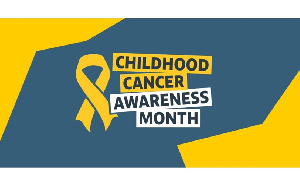Health News of Wednesday, 7 September 2022
Source: atlfmnews.com
Caregivers urged to give early treatment to wards with cancers
As Ghana joins the rest of the world to commemorate childhood cancers awareness month this September, founder of the Vivat Turkson foundation, Jane Williams Turkson says caregivers must send their wards for early treatment in the wake of any childhood cancer symptoms.
She notes that childhood cancer diagnoses frequently occur suddenly, thus parents must pay attention to their ward’s body, especially when they spot some symptoms that may be warning signs of the disease.
She indicates that in the wake of signs such as chronic bleeding, skin changes, belly pains, swelling among others, parents must as a matter of urgency rush their wards to the hospital for early treatment.
Madam Turkson said, “We advocate that as soon as you see these signs you quickly rush the child to the hospital so they assess the child, run further labs and tests, and then when it is ascertained that the child actually has cancer, they take it from there.”
She opines that seeking early treatment would help save children’s life, cut treatment costs and help reduce the high mortality rates associated with childhood cancers.
She further urged the public to discredit the notion that cancer of any form is communicable or a curse.
“Some parents feel that cancer is too big an illness for their child to really accept so they tend to refuse it. But in our world now, there is no illness that is too big or remote for any person”, she added.
She advocated for the public to show love to people living with such diseases instead of stigmatizing them.
Childhood Cancer Awareness Month
The idea of childhood cancer awareness month was originally introduced in 1990 in a presidential proclamation by the then U.S President, George H. W. Bush. However, the day was officially recognized on September 26, 2019.
It is observed annually in September to raise awareness of the issues that cancer patients, their families, and survivors encounter globally as well as to raise funds for research into its cause, prevention, diagnosis, treatment, and cure.
According to the World Health Organization (WHO), cancer is the second leading cause of death worldwide, representing nearly 1 in 6 deaths globally. Each year, an estimated 400,000 children and adolescents of 0-9 years develop cancers.
The most common types of childhood cancers include Leukaemias, brain cancers, lymphomas, and solid tumors such as neuroblastoma and Wilms tumors.
This year’s celebration has the theme “Close the Care Gap,” which according to Madam Williams Turkson, is important because it highlights the disparities in cancer care and the need for action to be taken to address those issues.
“We realize that there is a vast gap between awareness creations, with respect to people being aware of childhood cancers. And there is another gap when it comes to treatment of childhood cancers and there is also a gap in respect to facilities that help parents and caregivers and their wards,” she emphasized.
While acknowledging government’s effort over years to treat childhood cancer in the National Health Insurance Scheme (NHIS), Madam Williams Turkson emphasized that more needs to be done, given how expensive treatment for childhood cancers is.
Hence, she urged government and other non-governmental organizations to join her outfit to support children living with any form of cancer and their families.
Entertainment










